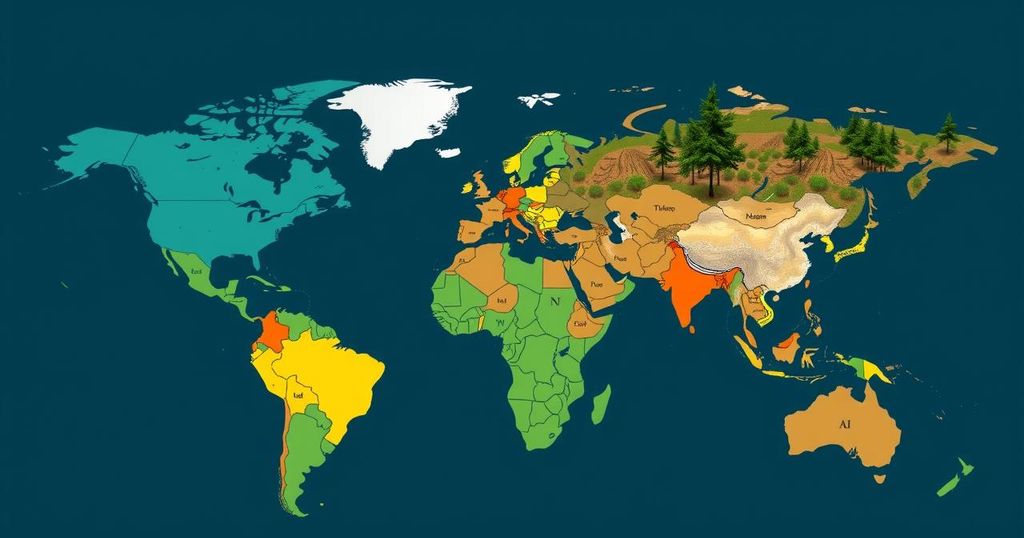Wealthier Nations Compensate Developing Countries for Climate Change Toll
Richer nations are beginning to compensate poorer countries for climate change-related damages, particularly highlighted by the payments following Cyclone Freddy in Malawi. Approximately $720 million has been pledged, but experts warn this amount may prove insufficient as disasters intensify. COP29 discussions are poised to determine further financial obligations to developing nations as they navigate the impacts of climate change.
In March 2023, Cyclone Freddy caused extensive devastation in southern Malawi, displacing families like Christopher Bingala’s, who lost his home and livestock. As a subsistence farmer, Bingala received a notable compensation payment of approximately $750, part of a new fund addressing climate change-related losses. This compensation initiative was created in response to the disproportionate impact of climate change on low-income nations, which contribute minimally to global pollution. Approximately $720 million has been pledged by wealthier nations, including the European Union and the United States, though experts caution it will be insufficient as climate-related disasters escalate.
During the ongoing COP29 climate summit in Baku, Azerbaijan, countries are discussing the financial obligations owed to developing nations as part of a broader climate finance package. Phil Davis, Prime Minister of the Bahamas, emphasized, “We just hope that the global north and the nations whose economy is fueled by the emissions – they come to the plate and take up their responsibility to look at what they’re causing us.”
Cyclone Freddy led to the displacement of 650,000 individuals in Malawi. Bingala recounted the harsh experience of searching for food amidst the cyclone’s aftermath and described how the cash payment enabled his family to rebuild and relocate to a safer environment. This payment came from Scotland, a pioneer in providing funds specifically for loss and damage due to climate change, administered through GiveDirectly, a non-profit that ensures direct aid to those affected without conditions.
The funding distributed allowed around 2,700 families in Malawi to regain stability through home reconstruction and agricultural investments. Yolande Wright, Vice President at GiveDirectly, noted that low-income households in these regions often lack insurance, making such assistance critical. The ongoing pilot program in Malawi is intended as a model for larger systems aimed at addressing loss and damage, with further negotiations at COP29 focusing on expanding these financial frameworks.
The financial implications of climate-related incidents are increasingly significant, particularly for already indebted developing countries. As immensity of disasters mounts, addressing the loss and damage funding remains urgent, with projections estimating needs may reach $250 billion annually by 2030. Prime Minister Davis posed a poignant question regarding the implications of inaction, stating, “If they do nothing, they will be the worst for it… They will either become climate refugees or they will be doomed to a watery grave.” This highlights the critical need for enhanced contributions from wealthier nations to mitigate the growing crises brought on by climate change.
The concept of ‘loss and damage’ financing emerged from the recognition that developing countries, which contribute the least to climate change, are suffering the most devastating impacts. As extreme weather events intensify, there is increasing pressure on wealthier nations to compensate those severely affected by climate-related disasters. The creation of a specific fund for loss and damage serves to acknowledge this disparity and aims to provide financial assistance to vulnerable populations, thereby facilitating recovery and resilience building.
In conclusion, as climate change escalates and its adverse effects disproportionately impact less affluent nations, there is an urgent need for effective funding mechanisms like the loss and damage compensation. This initiative, particularly exemplified by the case of Cyclone Freddy in Malawi, underscores the necessity of inter-country support and accountability from wealthier nations. Future contributions, currently pledging around $720 million, are crucial to aid developing countries and mitigate the escalating climate crisis, highlighting a moral and humanitarian responsibility.
Original Source: www.kanw.com




Post Comment